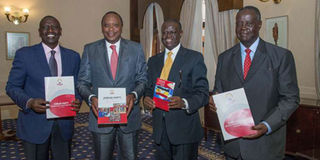Mergers nurture, not kill democracy

President Uhuru Kenyatta, Deputy President William Ruto, Senator Kiraitu Murungi and Hon. Noah Wekesa with instruments of the Jubilee Party at State House, Nairobi on July 29, 2016. The instruments will bring together parties belonging to the ruling coalition and their allies. PHOTO | PSCU
What you need to know:
- The upcoming merger of 12 parties to form Jubilee Party of Kenya is a timely political decision.
- Our politics breeds a strong sense of entitlement to State favours by those who back the winning horse after elections.
- Formation of only a few democratically constituted parties will break new ground in including political interests from various regions before elections.
- A President who lacks a commanding majority in both the National Assembly and the Senate would experience a nightmare trying to implement key flagship projects.
The sad footnote to the story of our country’s politics is the strong inclination towards ethnicity and regionalism.
This outdated view and practice of our politics automatically breeds a strong sense of entitlement to State favours by those who back the winning horse after elections.
In equal measure, it implants a feeling of exclusion for those political blocks that do not vote for the winning team.
Yet, when a government is formed, it’s meant to be for all Kenyans who have a right to be served by it without any iota of discrimination for previously-held political inclinations.
As such, therefore, it is imperative that a government that respects the fundamental rights of its citizens must strive to promote equality and equity in sharing the national cake.
I am happy with the development agenda of the Jubilee government due to how it has spread development to all corners of this country. The mega projects that have recently been launched since 2013 cannot be said to be skewed in favour of areas that predominantly voted for Jubilee.
That is why the upcoming merger of twelve parties to form Jubilee Party of Kenya is a timely political decision. This party will herald a new beginning in an effort by Jubilee leaders to dismantle parties hitherto associated with ethnic blocks.
Formation of only a few democratically constituted parties will break new ground in including political interests from various regions before elections.
Constructively, the new party structures have been crafted carefully, with an eye to have all stakeholders brought on board early to avoid the pitfalls of post- election relevance seeking theatrics.
One national party will do away with internal wars at the ballot where some affiliate parties are engaged in a vicious competition for lower seats while still supporting one presidential candidate.
It is now evident that a President who lacks a commanding majority in both the National Assembly and the Senate would experience a nightmare trying to implement key flagship projects.
The new structure will offer an open field for competition of party members at the primaries, after which winners and losers join hands for the bigger fight with the Opposition on election day.
Relegating registered parties to regional platforms of political emancipation isn’t what democracy is about. Once parties are too small to win the big election, they turn themselves into tools of political brinkmanship which is often more individualistic than regional or communal.
The bargaining would be better done before elections and under one roof, than when it is done from the disadvantage of a sore loser seeking to be accommodated in a political house built by others.
The disproportionality of seats among parties in the same alliance gives some a sense of entitlement and others a sense of servitude.
Harmonisation and centralisation of party affairs such as recruitment, logistics, human resource and communication could shoot costs down by almost half and be twice as effective.
Generally, formation of big parties with harmonised ideologies and manifestos is what this country needs.
In some quarters, it has been alleged merging political parties kills democracy. However, it is not like the merging of parties means there is no existence of other political parties. This is a voluntary decision by parties and is ratified by the top decision-making organs of such a party.
This means those who form the party can compare what they are able to achieve on their own vis-à-vis what they stand to gain when merged. It, therefore, means parties that agree to merge have evaluated and synthesised its gains.
This country is running on a thin thread of ethnic insecurity, fragile peace and cohesion and the more we craft political outfits that promote national integration, recognition and inclusion, the better.
We must start the journey of strengthening political parties as tools of governance that respect the rights of all Kenyans to be part of government.
Our various political parties must re-evaluate what they intend to achieve in the next dispensation. If they do so, they will know if they intend to go for it in their current fragments or as one united front. For Jubilee, we have decided to achieve our manifesto as one united house.
Mr Murungi is the MP for South Imenti; [email protected]




